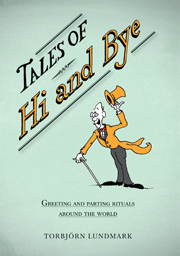Book contents
- Frontmatter
- Contents
- Acknowledgements
- To the reader
- Introduction
- Gestures & Signals
- Customs & Behaviours
- Names & Addresses
- What's so good about it? the curious nature of ‘good-’ greetings
- Ahoy, ahoy! Pick up the phone! ‘hello’ and its uses
- The unlucky Mr Szczęściarz: foreign names in foreign places
- Wang is King in China: too many people, not enough names
- Finding Björk: Icelandic names
- Yoo-hoo! Who? You! how Swedes don't address each other
- Mister Doctor: titles of medicos, surgeons and barbers
- I forget my name: loss of first name by marriage
- When your coz is your sis: kinship terms
- You, thou and other politenesses: familiar and polite ‘you’
- Include me out! dual, trial and other grammatical curiosities
- For me to know and you to find out: naming and name taboos
- Bye-bye! how things have changed
- Postscript
- Notes
- Sources
- Index
For me to know and you to find out: naming and name taboos
from Names & Addresses
Published online by Cambridge University Press: 04 February 2010
- Frontmatter
- Contents
- Acknowledgements
- To the reader
- Introduction
- Gestures & Signals
- Customs & Behaviours
- Names & Addresses
- What's so good about it? the curious nature of ‘good-’ greetings
- Ahoy, ahoy! Pick up the phone! ‘hello’ and its uses
- The unlucky Mr Szczęściarz: foreign names in foreign places
- Wang is King in China: too many people, not enough names
- Finding Björk: Icelandic names
- Yoo-hoo! Who? You! how Swedes don't address each other
- Mister Doctor: titles of medicos, surgeons and barbers
- I forget my name: loss of first name by marriage
- When your coz is your sis: kinship terms
- You, thou and other politenesses: familiar and polite ‘you’
- Include me out! dual, trial and other grammatical curiosities
- For me to know and you to find out: naming and name taboos
- Bye-bye! how things have changed
- Postscript
- Notes
- Sources
- Index
Summary
There is something mystical about names. The number of the beast, the Bible states, is 666 – a man's name, and one of the world's most enduring enigmas. In most cultures, names can be secret, divine, forbidden, powerful and dangerous to pronounce or even think of. If you know how, names can be used to exorcise evil powers, steal people's souls, or to bring about untold fortune. Your name is YOU. Perhaps this intensely personal connection with one's name is the reason why even the most secular and urbane people can get very irate and exasperated if their name is misspelt or otherwise misrepresented in the media.
The Inuit are only one of many peoples who believe that the essential ingredient of a human being is its name.
NAME AND CHARACTER
Your name is believed to be not only you, the person on earth, but also your destiny, as reflected in the ancient Latin saying, nomen est omen, or ‘name is fate’.
Does your name shape who you are? Does it affect your self-image? Do others perceive you according to the name you have?
Some modern sociologists believe so. Your name might affect both how other people form their first impressions of you, and how you might perceive yourself. For instance, if your name is ‘Sebastian’ or ‘Hubert’, or ‘Hortense’ or ‘Sybil’, others might already have some preconceived ideas about what you are like, as opposed to if they hear that your name is ‘Al’ or ‘Joe’ or ‘Becky’ or ‘Sue’.
- Type
- Chapter
- Information
- Tales of Hi and ByeGreeting and Parting Rituals Around the World, pp. 200 - 213Publisher: Cambridge University PressPrint publication year: 2009



